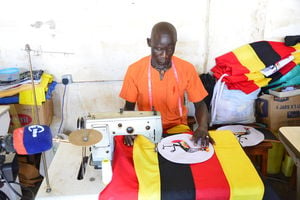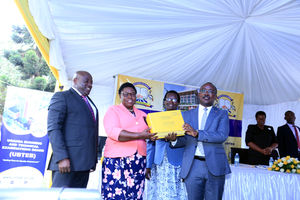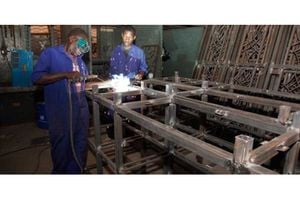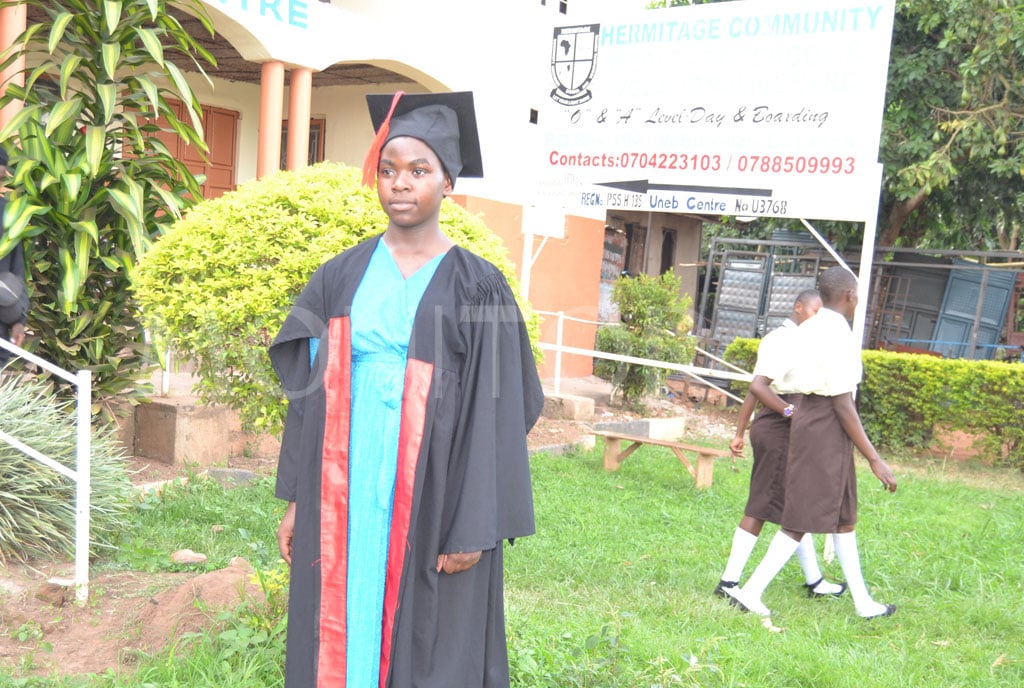
16-year-old Angela Namuddu, whose dreams are being shaped by her choice to undertake a course under a new educational setting in Uganda. PHOTO/DAN WANDERA
Aged 16, Allen Angela Namuddu is set to sit her national final Uganda Certificate of Education (UCE) examinations. However, when the results of the exams are released in 2025, it would not be the first or only certificate she has, having obtained one in Motor Vehicle Mechanics Level I under the Directorate of Industrial Training (DIT) programme.
Motor vehicle mechanics is considered a dirty job that attracts more males than females, but Namuddu is one of those who think differently about it and is already helping her family in its motor vehicle spare parts business in Kireka, a Kampala City suburb.
Her new skills in motor vehicle mechanics and proficiency in English language are a good addition to the spare parts sales outlet managed by her mother Agnes Nakku.
“I help in the motor vehicles spare parts sales, fittings and now the mechanics during holidays. We get customers that only speak English and can only describe the particular spare parts in English. I have found my new mechanical skills very useful to the family business,” Namuddu says.
Namuddu was introduced to the family business by her mother during her Primary Seven vacation so she could help with the business.
Admittedly, she did not know much about motor vehicle spare parts, but quickly learnt from her mother and other family members. Luckily, the Primary Seven results got her back to school for Senior One at Hermitage Vocational and Secondary School in Luweero District.
Because all schools were closed for more than one year, Namuddu in 2021 found herself back in the family business, helping out with the sales.
“I spent much time in the business and came to love motor vehicle repairing since I knew most of the spare parts. When we finally reported back to school, I consulted my parents about the motor vehicle mechanic course at our school. They encouraged me to enroll,” she says.
‘I was the only girl’
Because Hermitage Vocational and Secondary School had a range of other vocational subjects, Namuddu had to fight off the teasing and the stigma from the other girls who claimed she was behaving like a boy when she took on the mechanics course.
“My choice was very surprising to most of my friends, especially the girls. Many of them had gone for fashion design, tailoring, salon management and hair dressing courses. I was the only girl who chose a motor vehicles mechanics course,” she says.
Back at home, Namuddu also reflected on her family background where several of the siblings and the other relatives did motor vehicle driving, mechanics and sale of spare parts. She gained confidence when her mother promised to pay for the two-year certificate course.
Under the revised curriculum, the DIT is mandated to carry out the assessment and accreditation of the learners that have undertaken the respective vocational courses for award of certificates.
The subject areas include Art and Design, Performing Arts, Technology and Design, Nutrition and Food Technology, Physical Education, Information and Communication Technology and Entrepreneurship courses.
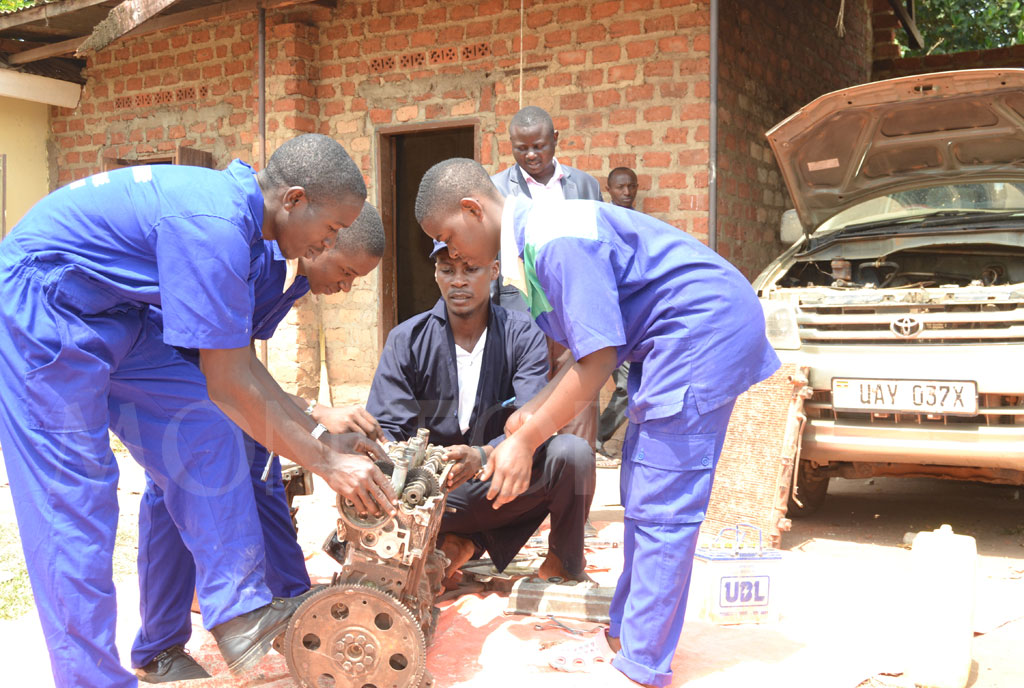
16-year-old Angela Namuddu(R) and her fellow mechanical students get instructions on car engine fixing from their instructor at Hermitage vocational secondary school in Luweero District in July 2024.PHOTO/DAN WANDERA
The vocational subjects that many students currently opt for include Motor Vehicle Mechanics and Driving, Welding and Metal Fabrication, Fashion, Design and Tailoring and Salon Management and Hair Dressing.
Herbert Kuuku, the Headteacher at Hermitage Secondary schools explains that the students attend the vocational courses on Wednesday and Friday where the subjects are allocated 80 minutes for the practical work.
“For the Level I Certificate, the students have both the theory and practical work. The courses take between one and two years for students in Senior One and Senior Two,” he says.
Juggling class work and mechanics course
For Namuddu, the love for both class work and the mechanics course played the trick in overcoming the worry of poor performance in class. She continued working hard in all the nine subjects in Senior Two and Senior Three, but was determined to earn her certificate in motor vehicle mechanics.
“Our school is located in a semi urban area where some of the practical work necessitated movement to a garage that is a bit far away. Our school director ensured that we succeeded. I also performed well and was among the best in the mechanics course,” she says.
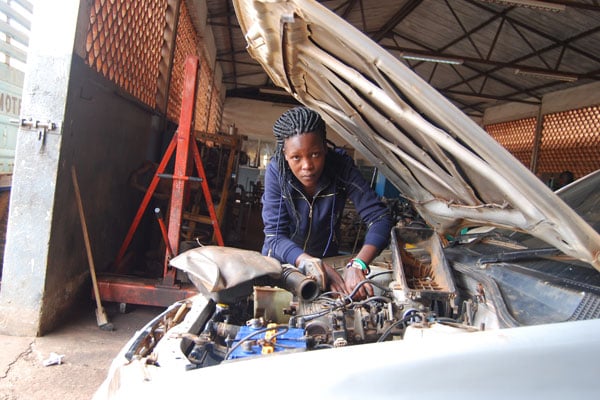
A student learning how to repair a car at Nakawa Vocational Institute in Kampala.PHOTO/GILLIAN NANTUME
By December 2023, Namuddu had completed her motor vehicle mechanics course and it was now time to concentrate on her Senior Four class work. She would later graduate in March 2024 with a DIT Level I Motor Vehicle Mechanics Certificate.
She decried some students and parents who did not pay for or take the final examination for the award of the DIT Certificate serious.
Challenges in vocational education
Daniel Kyaterekera Serunjogi, the School Director at Hermitage Vocational Secondary School says recent changes in the Lower Secondary Curriculum for Ugandan schools will perhaps cultivate positive value for vocational studies that have remained neglected by parents and students amid challenges.
“The revised Lower Secondary Curriculum provides an opportunity to enhance skills development for the students, but several of the schools are yet to appreciate the skilling programme for the children. We still need a mindset change programme for our communities,” he says.
He adds: “Schools undertaking the vocational studies on top of the normal academic programmes have to incur extra costs and time to explain and convince the parents and students for enrollment.”

Experts say there is need to allocate more resources in the training of young people in skills that create jobs. PHOTO/FILE/COURTESY
Kyaterekera believes that government must intensify awareness on life skills for the youth at an early stage.
The students, according to Mr Kyaterekera are supposed to initiate projects at school with the support of their respective parents, but this remains a challenge. Many parents, he says, are not willing to guide and support their own children.
“Some courses require learning material for the projects. Students are also required to register for the DIT exams, but several failed to register,” he observed, appealing to stakeholders to take vocational studies serious.
Luweero District senior education officer Enoch Kiyemba emphasized that these courses come with benefits.
“The advantage with the skilling programme under DIT is the award of both national and internationally recognised certificates at the different levels," he remarked last month.
DIT, which is under the Ministry of Education currently awards certificates for various disciplines after an assessment undertaken by accredited instructors.
But several secondary school head teachers and school directors say the vocational component for comes with extra costs that parents and school administrators struggle to pay.
"We welcome the vocational component in our lower secondary school curriculum, but the government should think of waiving some of the taxes imposed on the materials that we use. We are offering a service that the government is failing to recognise," Edward Ssebaana, a school proprietor in Luweero District told Monitor.
‘All eyes on mechanics, engineering’
Eyeing a glorious future, Namuddu says she is not ashamed of becoming unclean with the motor vehicle oils, dust and all the dirt that could come with the mechanics as long as she can earn a good living. She dreams of pursuing an engineering course after completing her A-Level.
“I don’t see myself going for a job outside mechanics and engineering. I don’t see a dirty job in mechanics when you are getting paid for work which many people can’t do even when they can drive the vehicles,” she says.
“I believe that my mother had a reason for allowing me to study vehicle mechanics since I was already helping her at the spare parts sales shop. When we get a spare parts customer and help fix the vehicle at the same time, it adds value to our family business,” she concluded.


